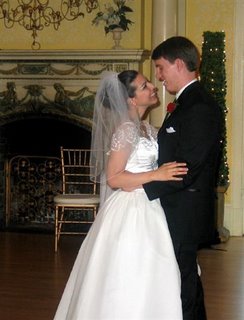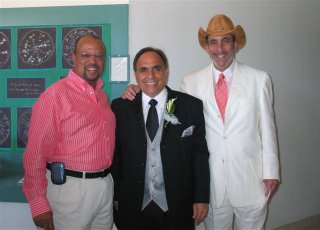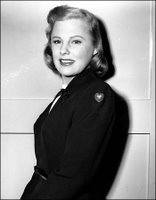

Photo on left: The father of the bride, flanked by both "best men" from his own 1982 wedding. From left to right, Oliver Glover, Jim Provenza and the author.
Photo above: The newlyweds, dancing the night away.
From my offline journal (often more candid than my blog) :
July 1 SacramentoJim and I finally connected by cell phone last night. The father of the bride was calling me from the wedding rehearsal dinner and was clearly in a hurry to get off the phone, so we kept it short. I just wanted to make sure he knew that we had arrived from Spokane and were in town. When I see him later today he’ll be wearing a tuxedo. That will be a first for us two “future astronauts” of long ago.
So Jennifer Rose Provenza, whose birth I recorded in these pages 23 years, six months and 18 days ago, is getting married this afternoon.
Although he’s frequently given to pithy thoughts and witty observations, usually having something to do with politics, in all of the years I’ve known her father I have never known him to be the overly reflective type, either drunk or sober. We were on different continents when his brother died, so we never really had the chance to get “down and dirty” on that subject, and in those few instances when it has come up, he has spoken mainly of its impact on his parents and offered speculation about the circumstances surrounding it. (To this day he suspects that Rick was merely having a beer-soaked reverie over the idea of suicide that evening, and that that police revolver’s going off in his hand was an accident. Well, yes, Colt service revolvers do have hair triggers.) But he has never really delved into its personal impact on himself, at least not in any conversation he's ever had with me. Odd that it should be so, given the fact that Jim worshipped his older brother to an extent that I have never witnessed in any other family. There wasn’t a quantum of sibling rivalry between them that I ever saw; indeed Jim seemed determined to follow Rick in his every ambition, in some cases succeeding where his brother failed, such as graduating from law school and yes, managing to stay married. But that’s Jim: I don’t think he has a mean bone in his body, and to use some extremely vapid ‘60s parlance, he has always been very “other-directed.”
But what must he be thinking now? Since I have no daughter of my own, I can only begin to guess. I do know what I’m thinking: I’m remembering an afternoon in Arroyo Grande, CA. Late October. Jennifer was not quite 3. Jim and Donna had driven up from Santa Barbara to visit me at my Aunt Jessie and Uncle Pete’s place, where I was house-sitting while they were on a trip to Europe.It was a mild afternoon and I think Jim and I went jogging together. The baby had been fussy before we left the house, crying and whining, and Jim’s mind was preoccupied with that, over and above other topics of discussion, as we walked back to the car. Ever the indulgent Baby Boomer parent, he insisted that we stop at the store on the way back to the house so he could buy her some cookies.I remember thinking this rather odd: in the household where I grew up, children were not rewarded with cookies for whining and crying. I doubt if such was the case in the house where Jim grew up, either. But there you have the key stylistic difference in the way two generations were raised: the Greatest Generation wanted its children (us) to have the educational advantages they hadn’t had. We were all browbeaten to get good grades and get ourselves into college, now that the G.I. bill had made college almost a universal entitlement and not the exclusive preserve of the well-off that it had been before WWII. But perhaps precisely because college wasn’t the Emerald City for us that it had been for our parents, we Baby Boomers merely wanted our own children to be coddled and spoiled as we, in our bottomless narcissism and self-regard, felt we should have been but were not. If we all live long enough, it will be interesting to see how Generation Y raises Generation Z. But in the meantime, good, bad or indifferent, there are the good old rituals to celebrate, the weddings and graduations and all that jazz that’s with us always, and interestingly enough, doesn’t seem to change that much from one generation to the next.
By the way, in addition to that afternoon in Arroyo Grande, I’m also remembering, from that same autumn, an apartment in Lompoc on whose living room carpet copies of
Mother Jones shared space with strewn-about Care Bears books. Jim was just starting out as a lawyer, racking up some experience working for legal aid. I was a weekend guest on my way down to Los Angeles, and the sight of
Mother Jones sharing the living room rug with the Care Bears struck me as the perfect metaphor for the transforming effect that Jennifer’s arrival had had on the lives of both of her parents, self-styled born-a-bit-too-late leftists who had been very proud of writing language about “working for social change” into their own wedding vows three and a half years earlier. I chuckled as I pointed out the strange confluence of reading matter to Jim. He was good-humored about it, as usual. Despite his passionate campaigning for George McGovern in 1972, (when he himself was still too young to vote) Jim managed never to take himself too seriously. Quite the contrary: he generally maintained an insouciance quite untypical of those earnest young savers-of-the-world who in our youth could talk about nuclear disarmament, and these days can talk about global warming, for as long as ten minutes without blinking once. Jim stopped wearing long hair after high school, switched from pot to liquor after college, and came away from the dreary 1970s almost as cynical about his own party as about the Republicans.
What he mostly was, by 1985, was a devoted family man, the doting father of a little girl. He kept his oar in politics, (today he serves on the Davis school board) but like those happy few among his fellow visionaries who are lucky enough to grow up and find personal responsibility as satisfying as public endeavor, what he mostly is, is a proud father.
I expect that the sight of this proud father in a tuxedo this afternoon may give rise to yet more, and similarly appropriate later-in-life thoughts. Jennifer was precocious as a performer: at age 3 she performed “Georgie Porgie” for a small but delighted crowd, of which I was part, in the middle of a children’s clothing store. I hear she’s going to sing Ave Maria today at her own wedding. She was also a strikingly pretty child, with enormous dark eyes and black hair. “She’s a wop all right,” her father said to me when she was a toddler. And I do expect to see a beautiful bride. Bring it on. Then go ahead and bring on old age for her folks and me, we of the generation so famous for being in denial about such things. Yeah, bring it all on.
End of excerpt from my "offline" journal. Back to blog...Ah, yes, this business of being a trailing-edge Baby Boomer...(by “trailing edge,” I mean born in the mid-1950s, and hence, about 50 yourself now...)
Reading glasses. AARP membership cards. A bit of morning stiffness in the joints, necessitating extra stretching before you go for that 8 a.m. jog, which by the way is now two miles, not the five it used to be.
Weddings. As in, “of your own children.”
I don’t have any children. What I do have is a friend, born the same year as myself, (1955—and ever since we were in the 6th grade together, he’s held his February birthday over my October one as a badge of seniority) who has two: a boy, 19, who plays bass guitar and has a ring through his lip, and a girl, going on 24, who just came down the aisle all dressed in white.
Jim Provenza, the proud father of the bride, is my oldest friend. This coming October when I mark my 51st birthday, he and I will also mark 40 years of uninterrupted friendship. We met in October, 1966 just about the time I turned 11. The first away-from-school activity I remember us doing together was that Halloween’s trick-or-treating. Jim, as I recall, donned a homemade “spy” outfit. Secret-agent movies were big that year; it was the height of the “James Bond” craze. He decked himself out in a trench coat and snap-brim hat, with an ascot for effect. I was a commando, complete with black turtleneck, black wool cap and plastic machine gun.
I was (co)-best man at Jim’s wedding in 1982. He was best man at my (second) wedding in 2005. He was also present, having traveled 600 miles both times to be so, at the funerals of my mother and my younger sister. I was in Europe when his older brother died, but pounced on the phone and called him the moment I received an e-mail informing me about it. He called me the moment his daughter Jennifer was born, on Dec. 12, 1982. I was in Europe when James Jr. came along five years later, but promptly got an e-mail informing me of that event as well.
Jim’s and my ongoing friendship is remarkable for other reasons besides punctilious attendance on each other’s family joys and tragedies. We only actually lived in the same town for about the first year and a half we knew each other, and only attended the same school one year. Then his family moved, and then my family moved, and we never lived in the same city again. But we stayed in touch, diligently, by letter, by telephone, even for a while, when we were both in junior high school, by sending audiotapes back and forth in the mail. As boys we shared the dream that many boys of the 1960s shared: we aspired to be astronauts. We even belonged to an organization called Future Astronauts of America, which I would be very much surprised to learn had ever graduated a single astronaut. When we moved on to high school, Jim became a debater and decided to focus on a political science major when he went on to college. I got interested in writing and decided I would major in English (I changed that to journalism and history later.) About the time we graduated from high school, Jim wrote me a letter in which he noted the curiosity that we two “future astronauts” should have ended up as English and political science majors.
And that’s not all that makes our friendship special. Our respective politics couldn’t be more different. I’ve been conservative all my life, while Jim, following in the footsteps of his beloved older brother Rick, who aspired to be a 60’s-style Berkeley radical but slightly missed the cut by being born a couple of years too late, is a passionately committed liberal Democrat, yellow-dog to the bone. In spite of all this, Jim and I have never had an argument about politics that I can recall. When we discuss politics, we stick to the things we agree on, such as the fact that most politicians, of whatever ideological stripe, have their price, and it’s usually not that high, either.
I flew to Sacramento to attend his 50th birthday party last year; he reciprocated and came to San Diego to attend mine eight months later.
My wife Valerie and I flew to Sacramento last weekend, this time from our new home in Spokane, Washington, to attend the wedding, in nearby Davis, of Jennifer Provenza and Ian Wallace.
It was a beautiful and beautifully conducted old-fashioned Catholic wedding, a family production with about 150 guests in attendance. The weather cooperated splendidly, at least early on, with unseasonably cool temperatures in the upper 80s. (Later it heated up to 103, but by then everyone was caravanning down to the reception venue, which just happened to be on the Sacramento River delta where it was cooler.)
Thematically the wedding was an ethnic smorgasbord, a sort of haggis stuffed with mozzarella. Ian’s old-world background is Scottish, while Jennifer’s is pretty smoothly Sicilian—she’s a Provenza on her Dad’s side and her mother’s maiden name is Calabria. A Scottish-Italian wedding in a Catholic church: as the guests filed in and took their seats, a bagpiper tootled away at the church door. Later, the groom’s father, of the Wallace clan, belted out “That’s Amore” at a family “variety show” which followed the ceremony. (Bride and groom met in their dramatic arts program in college; almost everyone involved the wedding was some kind of performer.) Jim’s mother got up and sang “The Nearness Of You.” I was amazed. I’ve known Mary Jane Provenza as long as I’ve know her son, and I never knew she could sing solo. Jim has no musical talent whatever; it never occurred to me that others in his family might.
Jim’s “other” best man from his 1982 wedding, Oliver Glover, was also in attendance along with his new bride, Elizabeth. I had not seen Oliver since Jim’s wedding, and we almost didn’t recognize each other. We sat together at the wedding supper and got caught up on what each has been doing in the 24 years since Jim and Donna tied the knot on that courthouse lawn in Santa Barbara, from which I still have some pictures, showing all of us with more hair and smaller stomachs than now.
I don’t know whose idea it was to have the wedding reception at that beautiful mansion house in the delta. I still don’t know. But by the time we got there we had driven so many miles along so many twisting country back roads that I was certain we’d gone off the map. “Okay, whose idea was it to have this thing in Borneo?” I demanded when we finally got there. Jim wouldn’t ‘fess up, neither would he name the culprit. Typical of him. I do know this: he’ll be paying for that party for years.
It
was a fine party, with plenty of good food and wine, and the bride and groom, who must have been dying by then to get out of their wedding-cake outfits and slip into Levis, duly made the rounds of every table, greeting all the guests. Nice kids.
I did, however, make certain that we left when there was still some twilight lingering to guide us back to the interstate. I didn’t want to get lost, go off the road and into the river, or have my wife and myself decimated by delta weirdos out of
Deliverance. The newlyweds, their parents, grandparents and many other members of the wedding stayed overnight at the mansion. Most of the rest of us had to get ourselves back to civilization, and I didn’t want to be doing that in the dark, especially after a few glasses of chardonnay with my meal.
We flew back to Spokane, by way of Boise, Idaho, on Sunday afternoon. Our two-propeller puddle-jumper slammed into some nasty turbulence -- a thunderstorm -- on approach to Boise, and as we bounced about the sky, some of our fellow passengers screaming with terror, (or perhaps with delighted terror, as you might on the roller coaster at Magic Mountain.) I only hoped my old buddy would appreciate my putting myself through this so that we two old farts could celebrate his daughter's nuptials together. I am in fact no fan of flying, even in the best weather, and he knows that, too. But you do things for family, and after all Jim and I have been through together in close to 40 years, I'd say each of us qualifies for honorary membership in the other's extended clan.
I hear the newlyweds are honeymooning in Hawaii. Add another year or two to how long Dad will be working to pay for all this. But it makes sense to me. At the very least it's perfectly consistent with the ethnic theme of the occasion. Kilts, plaid and bagpipes for a roomful of Provenzas and Calabrias, followed by "That's Amore" and now, tiki torches, surfing and luaus?
What kind of wedding is that?
American, that's what kind.
Have a good time, kids. Don't forget the sunscreen.





